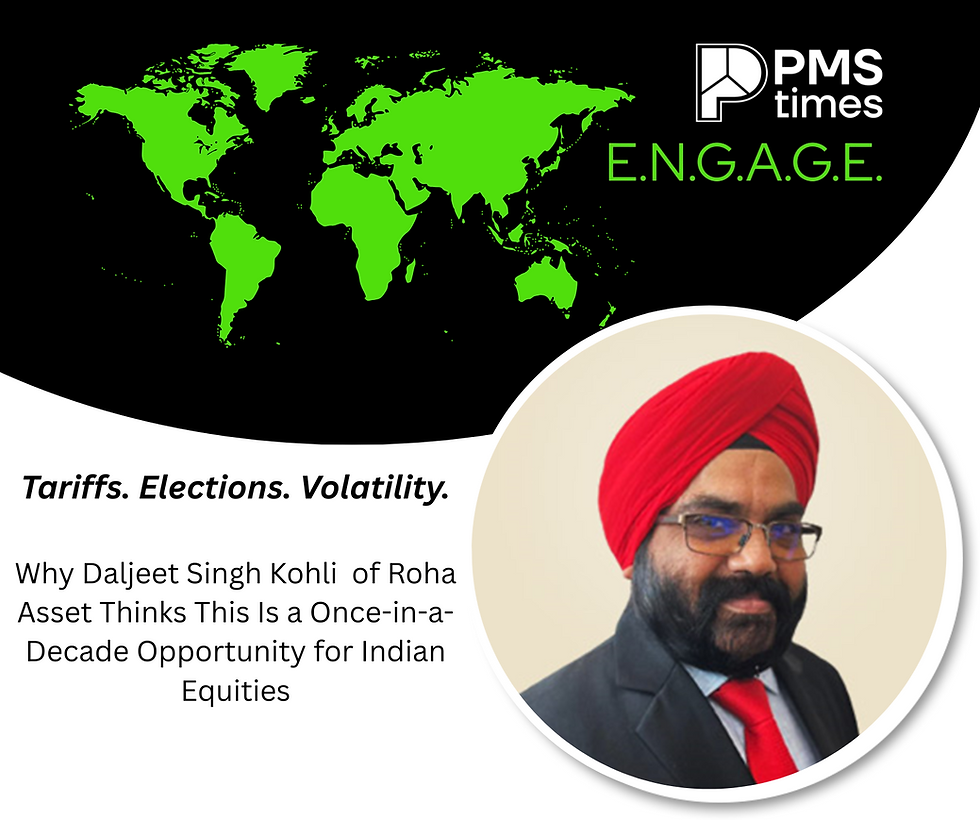Alpha in Transition: How Capgrow Capital Unlocks Value Through Special Situations
- Harbir Singh
- Jul 18, 2025
- 3 min read

In a world where macro uncertainty, high interest rates, and geopolitical risk dominate headlines, investors are hunting for strategies that can outperform irrespective of market direction. That’s exactly where Special Situation Investing, as practiced by Capgrow Capital, comes in.
At the latest edition of PMStimes E.N.G.A.G.E, we hosted Mr. Arun Malhotra, Founder and CIO of Capgrow Capital Advisors LLP, for a deeply insightful discussion on how event-driven investing can unlock alpha in India’s evolving equity landscape.
India’s Position in a Noisy Global Environment
Mr. Malhotra began with a sharp macro view. He acknowledged that while global markets are battling headwinds—slowing demand, high debt levels, and policy ambiguity—India stands out. With inflation moderating, a growth-supportive fiscal stance, and a strong domestic consumption engine, India is poised to be one of the few large economies growing with visibility and consistency over the next 12–24 months.
He noted, “We see India as a certainty island in a highly uncertain world. That makes this a perfect time for focused, conviction-led investing.”

What Exactly is Special Situation Investing?
Capgrow’s flagship PMS strategy is built around announced corporate events—like mergers, demergers, buybacks, delistings, and balance sheet restructurings. These are often situations where the market underestimates the impact of the event or misprices the transition period.
“Our return doesn't come from market beta—it comes from the realization of value during the corporate event,” Malhotra explained.
He emphasized that Special Situations are market-agnostic. They can generate alpha regardless of broader index movements because they rely on micro-specific catalysts.
Process Before Positioning
A core differentiator for Capgrow is its five-factor due diligence framework:
Business Fundamentals
Operational Efficiency
Governance Quality
Financial Health
Event Impact Analysis
In many cases, Capgrow supplements this with external validation. For instance, before investing in Kiri Industries, they engaged international legal counsel to verify the outcome of a $600 million arbitration—proving that conviction is backed by verification.
Portfolio Construction and Risk Controls
Capgrow maintains a concentrated portfolio of 20–25 stocks, with strict exposure caps (max 15% in a single stock, small-cap allocation limited to 10%). Every portfolio is built with Kotak Mahindra Bank as the custodian, ensuring full transparency, safety of client assets, and independent oversight.
Event timelines can vary, which introduces duration risk, but Malhotra stressed that the underlying business fundamentals remain protected—and that’s the safety net.
Performance and Philosophy
Since its inception in 2018, Capgrow’s Special Situations strategy has delivered a ~20% CAGR, outperforming the BSE 500 across up, down, and flat markets.
“We’ve closed 81 positions; 71 have been profitable. What matters more than batting average is how much you win when you’re right and how little you lose when you’re wrong.”
Drawdowns are actively managed, and the team follows a strict exit discipline: partial exits once the event is priced in, full exits if risk/reward skews negatively.
Key Insights from the Q&A
Event certainty is prioritized over speed of execution. Capgrow avoids speculative trades on unannounced events.
Cash deployment is dynamic—faster during market corrections, slower during frothy phases.
While Arun and Deepak Malhotra are the strategy's faces, Capgrow is supported by a four-member research team and external specialists when needed.
Final Takeaway
Capgrow’s Special Situations strategy is not for those chasing momentum or thematic cycles. It’s for investors who appreciate asymmetry, patience, and uncorrelated alpha. With a clear process, experienced leadership, and a strong record of delivering returns from transition-driven stories, it presents a compelling case for inclusion in any serious equity allocation.
“Volatility is not risk—it’s opportunity. We use volatility to buy certainty at a discount.” — Arun Malhotra



Comments